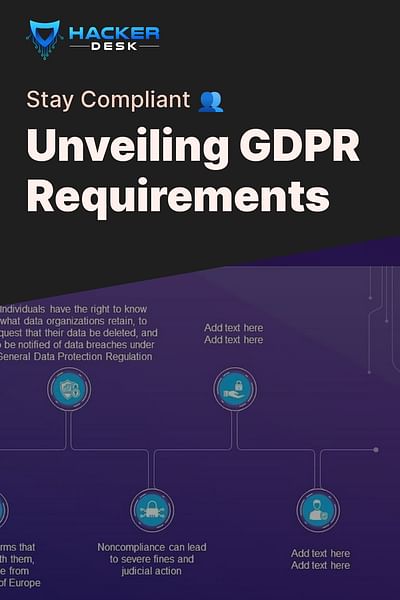Maya Braun is a seasoned expert in the realm of cryptography, driven by a profound interest in data privacy. Her professional journey has been dedicated to the design and development of secure communication systems, while also being a vocal advocate for digital rights. Maya takes pleasure in penning down her thoughts on the latest breakthroughs in cryptography and their potential impacts on privacy.
The General Data Protection Regulation (GDPR) is a comprehensive data protection law that was implemented by the European Union (EU) in 2018. It aims to protect the privacy and personal data of EU citizens and residents. As a cybersecurity professional, it's crucial to understand the requirements of the GDPR to ensure compliance and protect sensitive information. In this article, I will explain the key requirements of the GDPR and how they relate to cybersecurity.
1. Lawful Basis for Processing Personal Data: Under the GDPR, organizations must have a lawful basis for processing personal data. This means that they must have a legitimate reason for collecting and using personal information. It's important to ensure that the personal data you collect is necessary for the purpose you are processing it and that you have obtained the individual's consent if required.
2. Data Minimization and Purpose Limitation: The GDPR emphasizes the principle of data minimization, which means that organizations should only collect and retain the personal data that is necessary for the intended purpose. Additionally, organizations should clearly define the purpose for which the data is collected and ensure that it is not used for any other purposes without obtaining additional consent.
3. Data Subject Rights: The GDPR grants individuals certain rights over their personal data. These include the right to access their data, the right to rectify any inaccuracies, the right to erasure (also known as the "right to be forgotten"), the right to restrict processing, the right to data portability, and the right to object to processing. Organizations must have processes in place to handle these requests and respond to them within specific timeframes.
4. Data Breach Notification: In the event of a data breach that poses a risk to individuals' rights and freedoms, organizations must notify the relevant supervisory authority within 72 hours of becoming aware of the breach. They must also notify affected individuals without undue delay if the breach is likely to result in a high risk to their rights and freedoms.
5. Privacy by Design and Default: The GDPR promotes the concept of privacy by design and default, which means that organizations should consider privacy and data protection from the outset when designing systems, processes, and services. This includes implementing appropriate technical and organizational measures to ensure the security of personal data.
6. Data Protection Impact Assessments (DPIAs): DPIAs are a key requirement under the GDPR for high-risk processing activities. Organizations must conduct a DPIA to assess the potential risks and impacts on individuals' privacy and take measures to mitigate those risks.
7. Data Transfers: The GDPR imposes restrictions on the transfer of personal data outside the EU to countries that do not provide an adequate level of data protection. Organizations must ensure that appropriate safeguards are in place, such as using standard contractual clauses or relying on approved certification mechanisms.
8. Accountability and Documentation: Organizations are required to demonstrate compliance with the GDPR by implementing appropriate policies, procedures, and documentation. This includes maintaining records of processing activities, documenting data protection policies, and conducting regular audits.
In conclusion, the GDPR sets out several requirements that organizations must adhere to in order to protect the privacy and personal data of individuals. As a cybersecurity professional, it's essential to understand these requirements and implement appropriate measures to ensure compliance. By doing so, you can help safeguard sensitive information and build trust with your customers and stakeholders. For more information on GDPR compliance and cybersecurity best practices, visit HackerDesk, your one-stop solution for all things related to cybersecurity, network security, and more.











